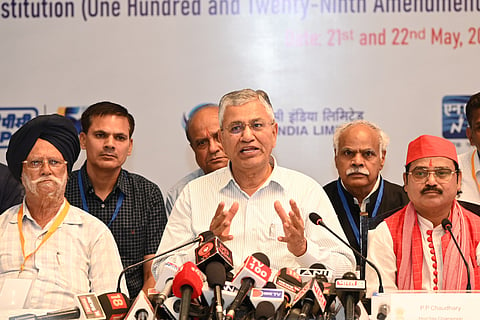

DEHRADUN: Uttarakhand Chief Minister Pushkar Singh Dhami has strongly advocated for the "One Nation, One Election" policy, emphasising its significant financial and logistical benefits for the Himalayan state. He stated that simultaneous polls would lead to substantial savings and streamline governance.
Addressing a Joint Parliamentary Committee on the 'One Nation, One Election' subject at a hotel on Mussoorie Road on Wednesday, CM Dhami underscored the significant disruption caused by staggered polls.
"Separate elections lead to repeated imposition of the Model Code of Conduct, bringing all state work to a halt," The Chief Minister revealed a stark statistic for Uttarakhand: "Over the past three years, due to Lok Sabha, Assembly, and local body elections, Uttarakhand's administrative machinery was deprived of policy-making decisions for a staggering 175 days."
Speaking on the occassion, P.P. Chaudhary, Chairman of the Joint Parliamentary Committee, stated there's "no fixed timeline" for their 'One Nation, One Election' report. He emphasised, "This crucial work for national interest demands thoroughness, not haste." The committee plans nationwide consultations.
Chaudhary highlighted that simultaneous polls would benefit the economy by five lakh crore, equivalent to 1.6% of GDP. "The state government bears the entire cost of Assembly elections, while the central government covers Lok Sabha election expenses," CM Dhami explained.
"If both elections are held simultaneously, the financial burden on both the state and central governments would be equally halved. This would result in a total saving of approximately 30 to 35 percent in overall expenditure."
He added that these saved funds could then be utilised in crucial sectors like health, education, roads, water, agriculture, and women's empowerment across the state.
The Chief Minister Dhami also highlighted the unique challenges faced by Uttarakhand due to its topography and seasonal variations. He noted that the period from June to September coincides with both the Char Dham Yatra and the monsoon season, making election management problematic.
"Similarly, election processes should not be scheduled during the last quarter of the financial year, from January to March," CM Dhami stressed.
"Board examinations in February-March also place additional pressure on administrative resources. For states like Uttarakhand, with its hilly and challenging geographical conditions, 'One Nation, One Election' is crucial."
CM Dhami further pointed out the difficulties in reaching polling stations in Uttarakhand's remote areas, which demand more time and resources for the election process.
He also observed that frequent electoral cycles can diminish voter enthusiasm and lead to a decline in turnout, particularly in mountainous regions.
"It becomes challenging for voters in hilly areas to participate in elections," he concluded, reiterating the need for a unified election system.